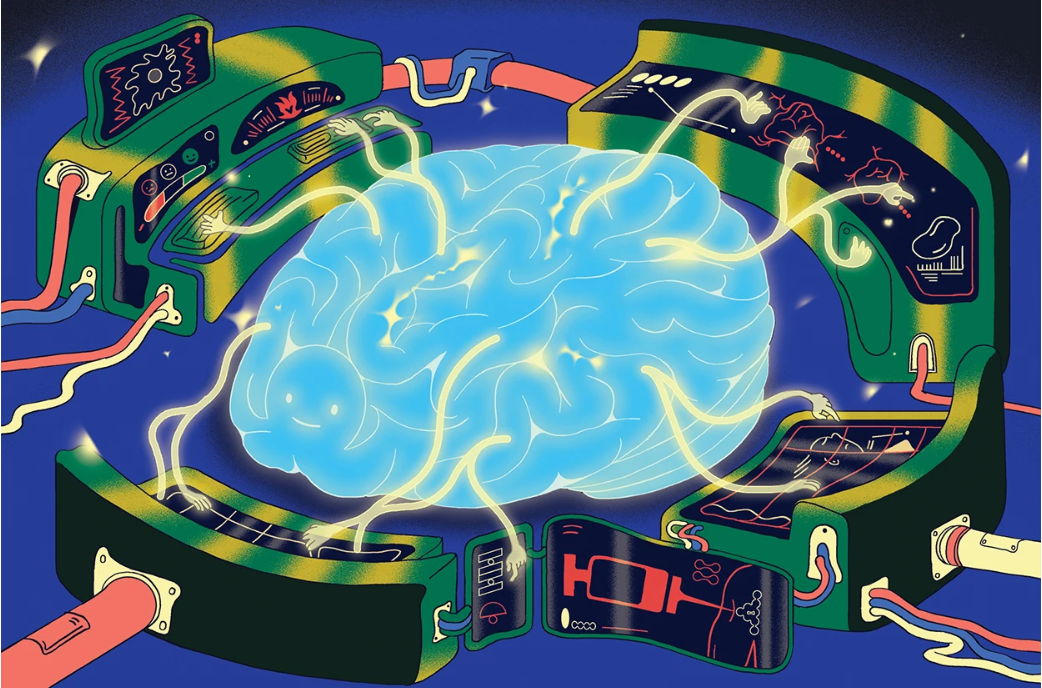February 22, 2023 – by: Diana Kwon
Scientists are deciphering how the brain choreographs immune responses, hoping to find treatments for a range of diseases.
Illustration by Dalbert B. Vilarino
Hundreds of scientists around the world are looking for ways to treat heart attacks. But few started where Hedva Haykin has: in the brain.
Haykin, a doctoral student at the Technion — Israel Institute of Technology in Haifa, wants to know whether stimulating a region of the brain involved in positive emotion and motivation can influence how the heart heals.
Late last year, in a small, windowless microscope room, she pulled out slides from a thin black box, one by one. On them were slices of hearts, no bigger than pumpkin seeds, from mice that had experienced heart attacks. Under a microscope, some of the samples were clearly marred by scars left in the aftermath of the infarction. Others showed mere speckles of damage visible among streaks of healthy, red-stained cells.
The difference in the hearts’ appearance originated in the brain, Haykin explains. The healthier-looking samples came from mice that had received stimulation of a brain area involved in positive emotion and motivation. Those marked with scars were from unstimulated mice.
“In the beginning we were sure that it was too good to be true,” Haykin says. It was only after repeating the experiment several times, she adds, that she was able to accept that the effect she was seeing was real.
Haykin, alongside her supervisors at the Technion — Asya Rolls, a neuroimmunologist, and Lior Gepstein, a cardiologist — are trying to work out exactly how this happens. On the basis of their experiments so far, which have not yet been published, activation of this brain reward centre — called the ventral tegmental area (VTA) — seems to trigger immune changes that contribute to the reduction of scar tissue.
This study has its roots in decades of research pointing to the contribution of a person’s psychological state to their heart health1. In a well-known condition known as ‘broken-heart syndrome’, an extremely stressful event can generate the symptoms of a heart attack — and can, in rare cases, be fatal. Conversely, studies have suggested that a positive mindset can lead to better outcomes in those with cardiovascular disease. But the mechanisms behind these links remain elusive.
Rolls is used to being surprised by the results in her laboratory, where the main focus is on how the brain directs the immune response, and how this connection influences health and disease. Although Rolls can barely contain her excitement as she discusses her group’s eclectic mix of ongoing studies, she’s also cautious. Because of the often-unexpected nature of her team’s discoveries, she never lets herself believe an experiment’s results until they have been repeated multiple times — a policy that Haykin and others in her group have adopted. “You need to convince yourself all the time with this stuff,” Rolls says.
For Rolls, the implications of this work are broad. She wants to provide an explanation for a phenomenon that many clinicians and researchers are aware of: mental states can have a profound impact on how ill we get — and how well we recover. In Rolls’s view, working out how this happens could enable physicians to tap into the power of the mind over the body. Understanding this could help to boost the placebo effect, destroy cancers, enhance responses to vaccination and even re-evaluate illnesses that, for centuries, have been dismissed as being psychologically driven, she says. “I think we’re ready to say that psychosomatic [conditions] can be treated differently.”
She is part of a growing group of scientists who are mapping out the brain’s control over the body’s immune responses. There are multiple lines of communication between the nervous and the immune systems — from small local circuits in organs such as the skin, to longer-range routes beginning in the brain — with roles in a wide range of diseases, from autoimmunity to cancer. This field “has really exploded over the last several years”, says Filip Swirski, an immunologist at the Icahn School of Medicine at Mount Sinai in New York City.
CLICK here to continue reading
Stay informed with MS news and information - Sign-up here
For MS patients, caregivers or clinicians, Care to chat about MS? Join Our online COMMUNITY CHAT




